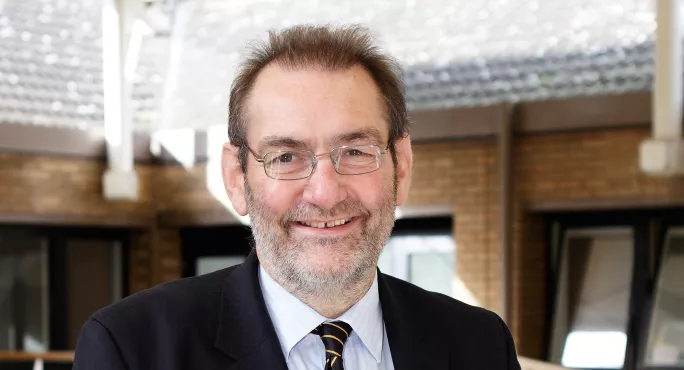
- Home
- Meet the man defining the college of the future
Meet the man defining the college of the future

There's not much about the education system that Sir Ian Diamond doesn't know. He's spent the best part of the past decade running a university, and even chaired a government review. Yet, he says his first role in further education, as chair of Edinburgh College, has left him staggered.
“It has been absolutely brilliant," he states. "There have been surprises, but let me be very clear: they have all been good ones. I had no idea, I will be honest, of the breadth of what Edinburgh College does.”
The former vice-chancellor of the University of Aberdeen and chief executive of the Economic and Social Research Council took up his post at one of Scotland’s largest colleges last year. He previously chaired the Higher Education Review for Wales in 2016.
But his latest appointment – as chair of the Independent Commission on the College of the Future – could prove to be one of his most significant roles to date.
Read more: Commission on the 'college of the future' unveiled
More views: What will colleges look like in the future?
Background: College mergers: Is England following Scotland on the troubled road to FE reform?
'Passionate about FE'
Edinburgh College was created through a merger in 2012, and in the years that followed, underwent a significant transformation into one of the largest FE institutions in the UK. Sir Ian says he decided to apply for the post last year because he had been “passionate about FE all my life”.
“I have seen first-hand from friends the way in which FE can transform lives and give people the opportunity they would not otherwise have had," he says. "That does not just go for people at the younger age, but something that benefits people throughout their lives.
"We live in a world where people are going to need to revisit their skills base on a number of occasions throughout their life. There are fantastic things going on in colleges around Scotland, and from what I see, in England too."
Colleges should be “the pivot between schools, skill and higher education”, he says, telling Tes that colleges were often seen as the “hidden gems” of the education system, and that the work of the commission would aim to raise the sector’s profile.
'A heartbeat to decide'
Sir Ian tells Tes he decided to chair the commission, set up by the Association of Colleges (AoC), almost as soon as he was asked.
“It took me less than a heartbeat to decide,” he recalls.
“One of the things that impressed me was that the AoC was putting together a real group of experts from across the UK to be able to reflect on what FE should be, and reflect on how it could increase its reach and quality."
The point of the commission would be to ask colleges right across the UK “what is it we think a college should look like in the next decade or so if colleges are to be the pivot between schools, skills and HE”, he explains, adding that this “moment of reflection” should be used to “celebrate and raise the profile of colleges”.
The commission is aiming to learn from good practice right across the UK and offers an opportunity for individual institutions to do the same, whereas policymaking in recent years could be accused of shying away from looking across the home nations.
“I don’t think there is a reluctance to look across borders, but I do think everybody is working incredibly hard,” Sir Ian comments.
Making a difference?
FE colleges, he adds, are important drivers of their local economies. But this can be a double-edged sword: being so embedded locally, Sir Ian believes, can make it difficult for colleges to become aware of examples of good practice elsewhere, not least given that tertiary education policy across the four nations "continues to diverge". This is a trend he hopes the commission can reverse.
“At the end of the day, context is important, but quality cuts across context and we need to be looking at the different contexts to say to policymakers, ‘This might help.’ But we still need to be looking at the best way to engage with our local communities for the skills they need and to really understand what are the factors that are impacting on students, day in and day out, in getting the skills they need.”
A group of experts from across England, Scotland, Wales and Northern Ireland has been formed to help the commission in its task. And time is of the essence: there won’t be a formal call for evidence, Sir Ian says, “because they take a long time”.
So, given the flurry of commissions on skills and adult education that have been created in recent months, what is the key to making sure this particular commission has an impact?
“Make recommendations that are difficult to disagree with and easy to implement,” Sir Ian replies. “I would like to feel that we have made some recommendations that have improved the quality of FE in a way that it is ever more the pivot between schools, skills and higher education.”
Register with Tes and you can read five free articles every month, plus you'll have access to our range of award-winning newsletters.
Keep reading for just £4.90 per month
You've reached your limit of free articles this month. Subscribe for £4.90 per month for three months and get:
- Unlimited access to all Tes magazine content
- Exclusive subscriber-only stories
- Award-winning email newsletters
You've reached your limit of free articles this month. Subscribe for £4.90 per month for three months and get:
- Unlimited access to all Tes magazine content
- Exclusive subscriber-only stories
- Award-winning email newsletters



